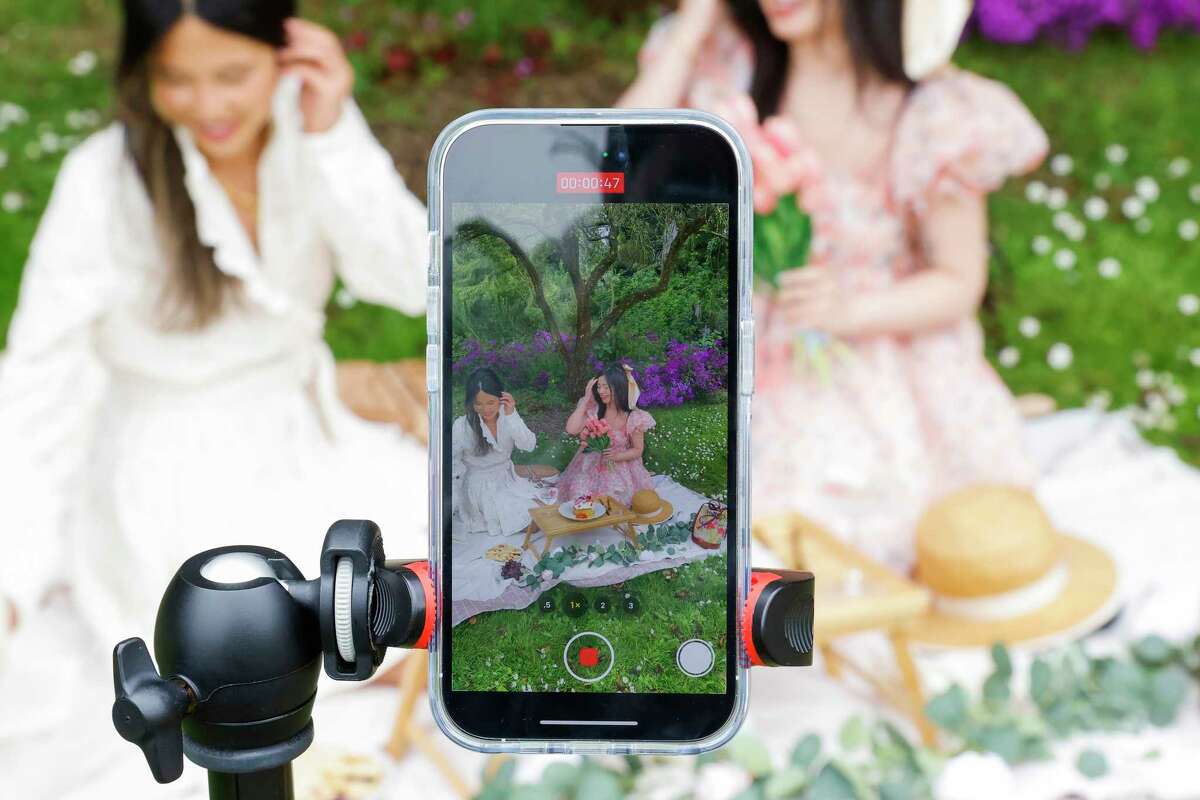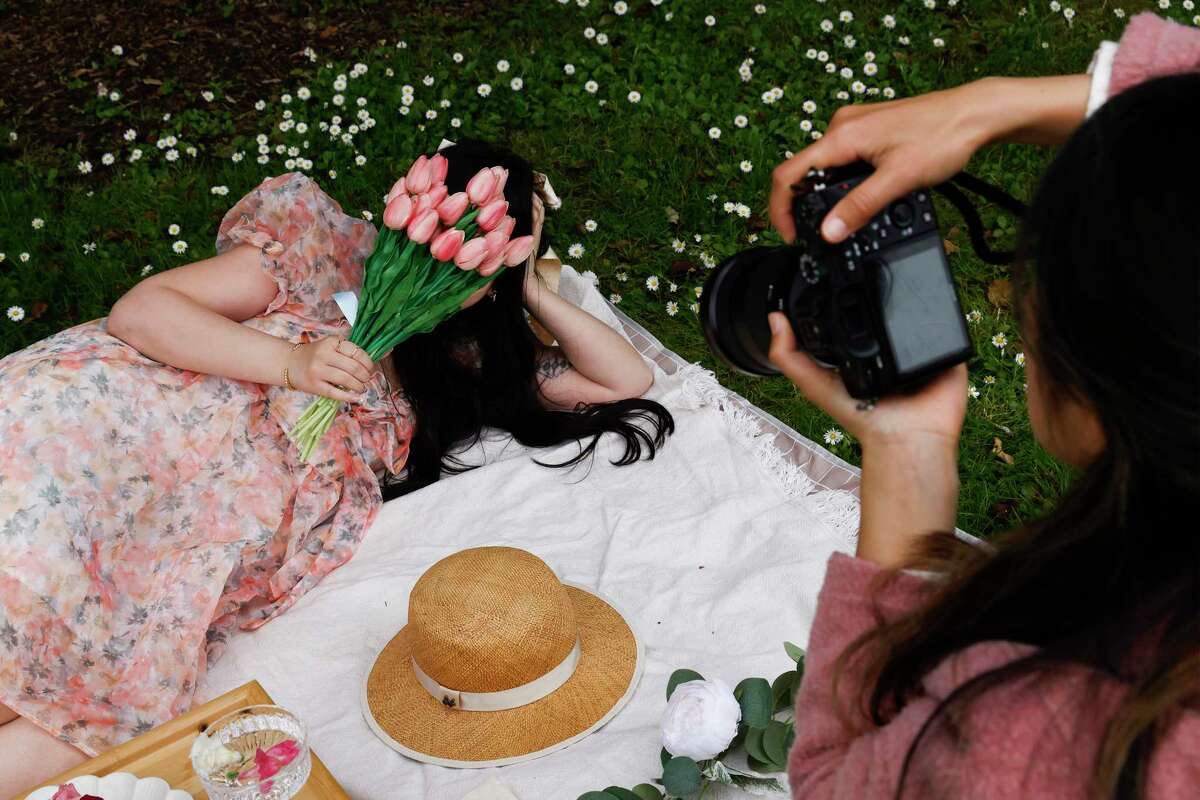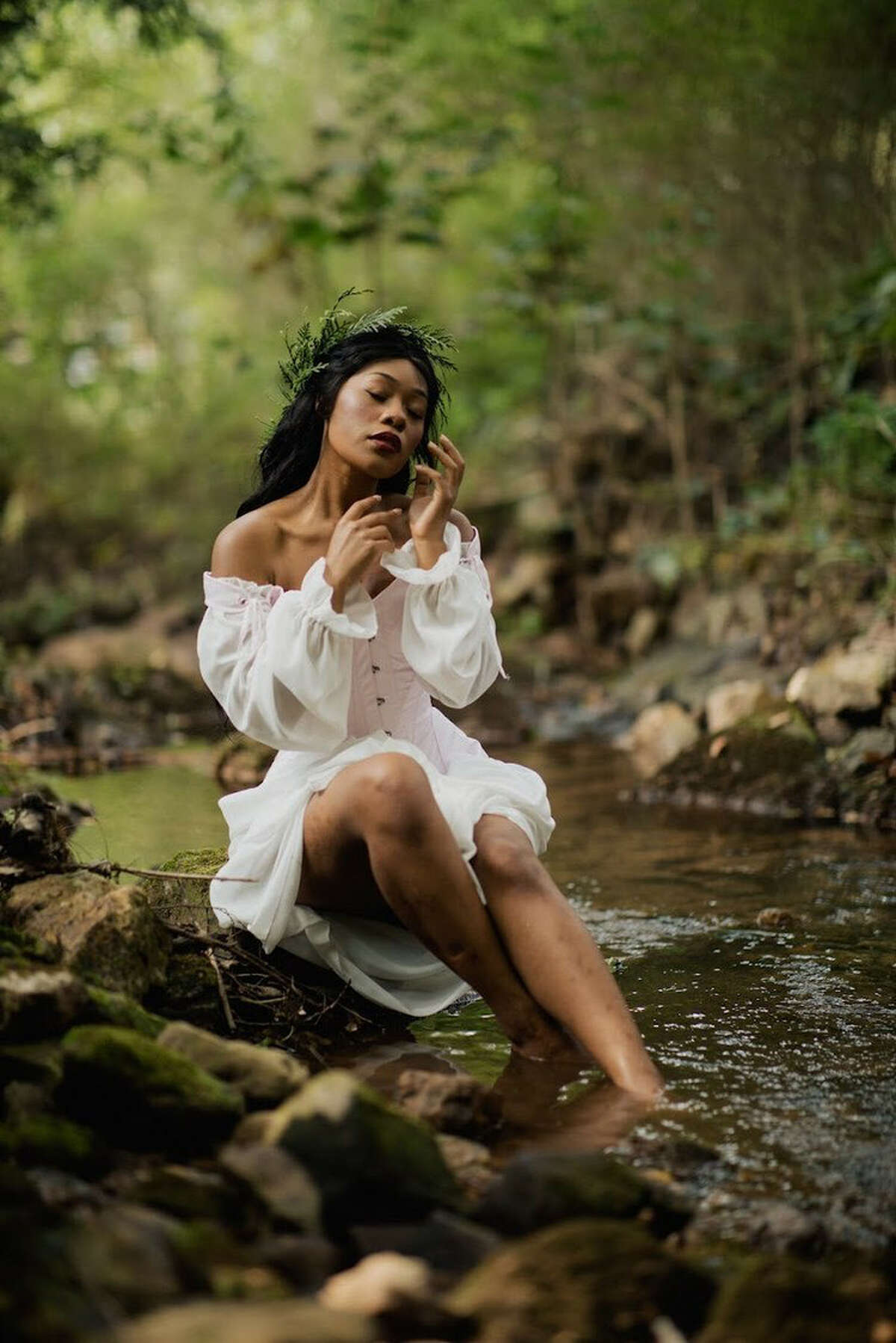Two years ago, Cristina Viseu, 30, of San Francisco identified as a girl boss. She was working for an extremely vibrant beauty brand and had become a self-described corporate girl who made work her life. Today, Viseu has more than 250,000 TikTok followers for being the complete opposite: a tender girl.
On TikTok, reels with the hashtag soft girl have over 2 billion views. The soft girl aesthetic comes in many forms: the Disney princess, the cozy gamer, young people who dress like their grandmothers but, overall, it promotes a romantic life and self-care over the capitalist grind of modern life .
The aesthetic has become synonymous with mostly white women in lovely dresses posing before dreamy backdrops a bed of tulips, a soft purple sunset, a cherry blossom. But that doesn’t take into account content creators of color like Viseu, who is Chinese and Portuguese American.
During the pandemic, Viseu quit her job, took a hybrid one, and started posting reels of herself doing seemingly mundane activities: throwing dinner parties, going to the park, watching a movie. Except that every Instagram or TikTok post had a glossy finish: the dinner plates were heart-shaped, the park paraphernalia was uniformly pink, and the movie was accompanied by three perfect desserts, fresh flowers, and the warm glow of the sunlight. candles.
The soft girl aesthetic is a less hectic and chaotic lifestyle, Viseu said. It’s a slower life, basically, and it allows me to lean into my womanhood.
But the aesthetic has also started a heated debate on the internet about how it’s a healthy representation of a mellow lifestyle. For some, the soft-girl aesthetic is a tailor-made reject of corporate life. But others say it’s just capitalism in a nice disguise, and that its depiction of the easy life and dewy womanhood is classist, racist, and sexist.

Ally Chen (left) joins her friend Cristina Viseu for her staged picnic at the San Francisco Botanical Gardens. Viseu added 50,000 TikTok followers in the past three months for posting soft girl videos of elaborate picnics and decadent dinner parties, online content she says promotes self-care and femininity.
Jessica Christian/The ChronicleCindy Noir, a motivational content creator in Dallas, says she has yet to see soft girl content that explains how to participate in that lifestyle in an affordable way.
There are those of us who work two or three jobs to make ends meet who are kicking our asses to the bone, he said. So how are you going to tell that type of woman to incorporate a rose bath after she’s just finished her second shift of the day?
As critics have pointed out, not everyone can afford to be an influencer, nor does everyone have time for indulgent self-care routines. Soft girl influencers like Viseu, whose TikTok following has grown by 50,000 in the past three months, are paid to promote product lines. They partner with brands like Alaska Air and luxury cologne brand Jo Malone and link to online stores where followers can buy their wares.
Meanwhile, the conventional standards of femininity typical of soft girl influencers reinforce sexist and racist ideals, critics say.
As a Black woman, the soft girl aesthetic doesn’t work because so much of the aesthetic is just the culture of the white woman, said Noir, who is Black. And many of the fluffy black girls I’ve seen seem to be wearing a mask, like they’re trying to be something they’re not by assuming white identity.
Hope Carpenter, a queer and gender-fluid content creator in Montana, is concerned with how the soft girl aesthetic portrays gender.
You have to, like, exhibit femininity on the internet to be considered soft, they said. And the soft girl aesthetic feels like a throwback to 1950s gender ideas.
Fluffy girls of color like Viseu, whose content includes Asian American staples like spicy Korean snacks, bento box tutorials, and Studio Ghibli merchandise, find themselves in a controversial position.
They say, Oh, you’re trying to live this Caucasian female lifestyle, Viseu said. But I actually like living like this.
As in rock n roll and drag culture, the origins of softness are conveniently lost.

As soft girl content skyrockets and becomes more profitable, so do criticisms that its portrayals of easy living and old-school femininity are classist, sexist, and racist. The debate is most intense for creators of color like CristinaViseu (left), who is Chinese and Portuguese American, and includes nods to Asian-American culture in her content.
Jessica Christian/The ChronicleQueer Black Roots of an Internet Phenomenon
During the pandemic, the term soft life, meaning comfortable and joyful life, emerged from Nigerian slang as the country experienced its worst recession since the 1980s. And before it appeared in the captions of social media influencers, radical self-care was first described in the late 1980s by black feminist author Audre Lorde and discussed by other queer black feminists such as Angela Davis and Bell Hooks. .
Taking care of myself isn’t self-indulgence, it’s self-preservation, and that’s an act of political warfare, Lorde wrote in her 1988 collection of essays, A Burst of Light.
But when Lorde spoke about taking care of herself 35 years ago, the culture of the social media influencer didn’t exist, while the online soft girl has become heavily monetized and synonymous with a certain image, said Andi Schwartz, coordinator of the Center of Feminist Research at York University. in Toronto. And when the sweet life was coined in Nigeria as a rejection of the expectation that black women should have a hard life, its original meaning was more about leisure than visual displays of luxury.
I think there’s a difference between softness as a way of being in the world, which isn’t necessarily aesthetic, and this Internet subculture which is very aesthetic, said Schwartz, who identifies as a soft femme and wrote her thesis Femme Queer Internet Culture Doctoral Program. . Instagram culture has become marketing to sell something.
Known as Enchanted Noir on TikTok, Lauren Foster, 32, is a soft Black girl living in Philadelphia whose content has become so profitable she’s forming an LLC.

While dedicating just two days a week to creating content, Lauren Foster, 32, of Philadelphia, known as Enchanted Noir on TikTok, has managed to make $40,000 in the past two years from her sweet-girl hustle.
Courtesy of Lauren FosterWhile only dedicating two days a week to creating content, Foster has managed to make $40,000 in the past two years from her hustle and is about to head off on a trip to Europe paid for by a brand she partners with, she says. She focuses primarily on caring for her children while her partner works full-time, but she says she’s been offered up to $5,000 for a single job. She companies like Adobe, Instagram, Poshmark and Hill House have approached her about brand partnerships, she says.
Foster acknowledged that corporate appeals to diversity are part of what draws some brands to her.
In 2020 and 2021, when Black Lives Matter was so prevalent in the world, companies wanted to push the agenda to be inclusive, Foster said.
Since her video titled You’ve Made It to Black Girl Cottage Core went viral in 2020 when fluffy girls of color weren’t as visible, she says Foster regularly graces her more than 257,000 TikTok followers with photos of her in corsets and lacy gowns, cinematic reels of her running across fields in vintage-inspired gowns, and unboxing videos for brands like Selkie, whose signature puffy gown is a wardrobe staple among many soft girl influencers.
But Foster says she also receives scrutiny that ranges from comments that she’s trying to be a white girl to direct messages accusing her of appropriating European culture to an overtly racist message telling her she should dress like a slave.
Schwartz’s general response to soft girl criticism is, in essence, don’t hate the gamer, hate the game.
Anything women do on the Internet will be criticized, Schwartz said. But the soft girl aesthetic challenges our idea of work because, if they’re able to make money posting videos of themselves preparing food or whatever, the joke is somehow on the people who criticize them.
There are still spaces on the internet that echo the queer roots of softness, where open reflections on mental health take precedence over marketable aesthetics.
For Hope Carpenter, softness is about honoring their vulnerability and healing their inner child. After Carpenter left an abusive relationship in 2021, a year and a half of criminal court and family court ensued.
Financially strained and working multiple jobs, Carpenter had little time to take care of himself, but he started creating memes about trauma and healing. A recent post features a protagonist from Hayao Miyazaki’s animated fantasy film My Neighbor Totoro with the caption the sensitive need to let the walls I’ve built against love fall gently. Their Instagram following grew from a few thousand to 439,000 in just a couple of years.
It comes from a place where I realized there’s nothing wrong with the way I am, they said. Interconnected systems of oppression are wrong.
Rarely sharing photos of themselves, Carpenter is open about the abuse they’ve endured through lengthy text threads like one titled, Why being told everything happens for a reason can be so painful as a trauma survivor. To this day, they say, they get regular messages from followers saying Carpenter’s content saved their lives.
While soft pinks and purples may dominate their meme curation, Carpenter is against associating softness with any aesthetic.
Softness doesn’t have to be conventionally feminine to be soft, they said. Softness is not binary.
Olivia Cruz Mayeda is a reporter from Oakland. Instagram: @oliviacruzmayeda
#internet #heats #soft #girl #culture
Image Source : www.sfchronicle.com
